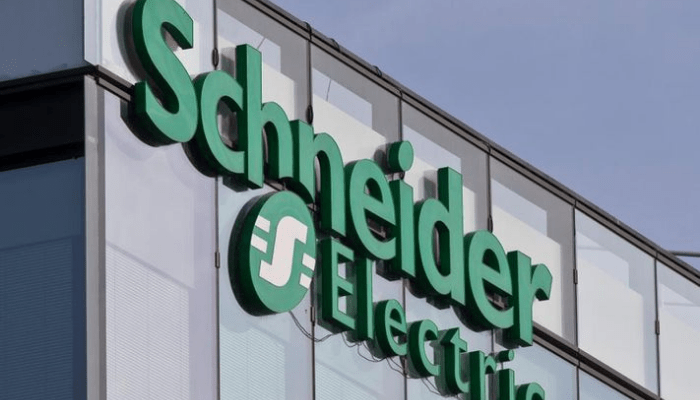The World Economic Forum (WEF) has honoured Schneider Electric for its innovative AirSeT technology, a groundbreaking sustainable design aimed at revolutionising energy management and power distribution. The recognition highlights Schneider’s continued leadership in promoting eco-friendly solutions that support global net-zero targets.
In a statement issued by the company, the WEF commended Schneider Electric’s AirSeT for its gas-insulated switchgear (GIS) innovation that eliminates the use of sulphur hexafluoride (SF₆), a potent greenhouse gas widely used in the electrical industry. The AirSeT system replaces SF₆ with pure air and vacuum interruption technology, significantly reducing environmental impact while maintaining high performance and reliability.

According to Schneider Electric, the recognition underscores the firm’s commitment to driving sustainability across its operations and product lines. The company stated that AirSeT was developed in response to the growing need for greener alternatives in power infrastructure, particularly as countries and industries work toward decarbonisation and cleaner energy transitions.
Speaking on the award, Executive Vice President of Power Systems at Schneider Electric, Frederic Godemel, described the WEF recognition as a testament to the company’s innovation-driven sustainability agenda. “We are proud that our AirSeT technology has been recognised globally as a transformative solution for sustainable power management,” Godemel said. “By eliminating SF₆ and replacing it with pure air, we are setting a new benchmark for the industry while helping customers achieve their environmental goals.”
The AirSeT innovation is part of Schneider Electric’s broader sustainability roadmap, which aims to reduce the carbon footprint of its products and operations by leveraging digitalisation, efficiency, and clean technologies. The system is designed to be cost-effective, modular, and suitable for both urban and rural power distribution networks, offering utilities and industries a sustainable path toward electrification.
Industry experts have hailed AirSeT as a game-changer in grid modernisation efforts, noting that its adoption could significantly reduce greenhouse gas emissions associated with the power sector. Energy policy analyst, Dr. Aisha Odu, noted that the transition to SF₆-free switchgear is a crucial step in meeting climate action commitments under the Paris Agreement.
“SF₆ has been one of the most potent greenhouse gases used in industrial applications, with a global warming potential thousands of times greater than carbon dioxide,” Odu explained. “By developing AirSeT, Schneider Electric is not only contributing to emissions reduction but also demonstrating how innovation can align with sustainability.”
The WEF’s recognition also aligns with Schneider Electric’s consistent inclusion in global sustainability rankings. The company was recently named one of the world’s most sustainable corporations by Corporate Knights for its continued efforts to integrate green technologies, energy efficiency, and circular economy principles into its business operations.
In recent years, Schneider Electric has intensified its focus on helping industries digitise their energy systems to improve efficiency and cut emissions. The company’s EcoStruxure platform, for instance, integrates digital and automated technologies that help organisations monitor, manage, and optimise energy usage in real time.
Godemel further stated that AirSeT’s recognition would inspire the company to accelerate its mission of creating resilient and environmentally responsible energy systems worldwide. He reiterated that collaboration with governments, utilities, and private sector players was essential to scale sustainable technologies and meet global climate goals.
The WEF’s award highlights how sustainability is becoming a key metric of innovation, particularly in sectors traditionally reliant on heavy industrial gases and high-energy processes. Schneider Electric’s approach demonstrates how technology-driven companies can balance performance, reliability, and environmental responsibility in their product development strategies.
Beyond environmental benefits, the AirSeT technology is also designed with operational flexibility in mind. It allows utilities and industries to integrate renewable energy sources more seamlessly while ensuring power system safety and stability. The product’s modular nature makes it easier to deploy in both existing and new infrastructures without significant retrofitting costs.
The honour from WEF adds to a growing list of global recognitions for Schneider Electric’s sustainability leadership. Earlier in the year, the company received the “Sustainability Champion” award at the 2025 Energy Transition Forum in recognition of its net-zero commitments and technological innovations.
As the world intensifies efforts to combat climate change, the demand for sustainable technologies such as AirSeT is expected to grow rapidly. With its innovative approach, Schneider Electric continues to demonstrate how responsible engineering and digital transformation can accelerate progress toward a cleaner and more efficient global energy ecosystem.
Industry observers believe that recognitions such as the WEF award not only validate Schneider’s environmental leadership but also encourage broader adoption of sustainable practices across the global power and energy industry.
By leading through innovation and sustainability, Schneider Electric’s AirSeT technology sets a new industry standard — one that could reshape how electricity networks are built, managed, and maintained in an era defined by the urgent need for climate action and sustainable growth.
Support InfoStride News' Credible Journalism: Only credible journalism can guarantee a fair, accountable and transparent society, including democracy and government. It involves a lot of efforts and money. We need your support. Click here to Donate
